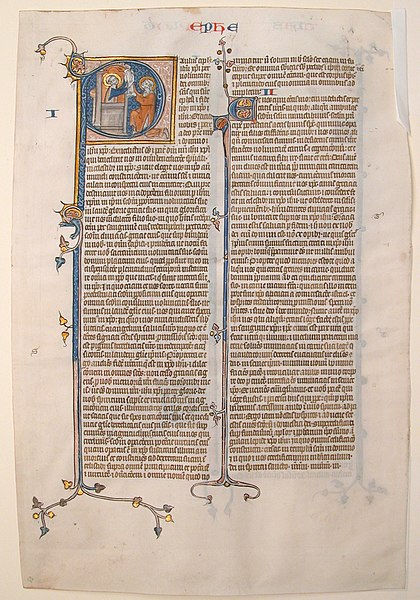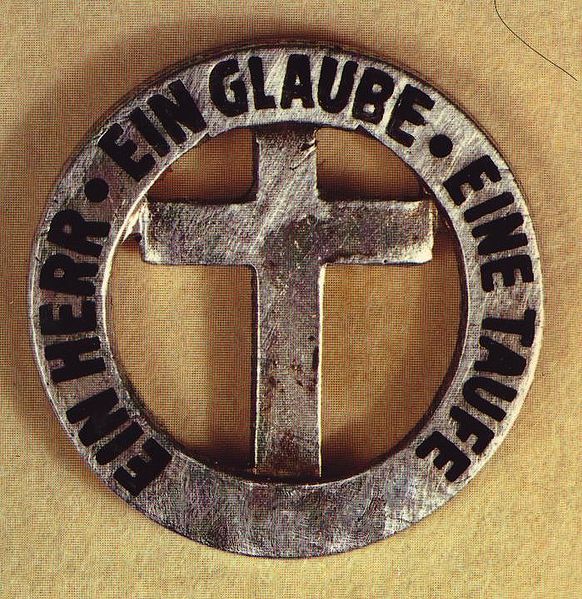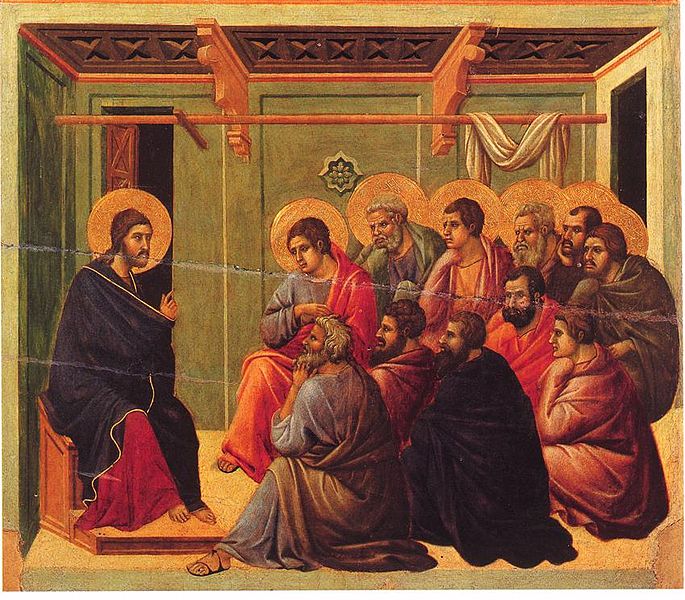パウロの預言者側面
[toggle]Paul’s Prophetic Side [/toggle]先週、私は、パウロにたどり着く前に、聖書の議論を中断した。前回の議論の内容をまとめると、私たちのよくある聖書理解に反して、教会が目的達成のための手段(教会の目的は、伝道して世界をより良い場所にすること)だとは、旧約・新約聖書には書かれていない。ただし、「教会はそれ自体が目的だ」と私が主張しているというのは誤解だ。私の議論がなぜそう読まれたかは分かっている。より正確に言えば、教会の目的は神であり、神の前での私たちの交わりなのだ。とにかく、パウロを見てみよう。
[toggle]Last week, I left off the biblical argument just before I got to Paul. The argument, in case you are new to the series, is that the Old and New Testaments, contrary to our usual reading, don’t think of the church as a means to an end (i.e., the church’s purpose is missional, to make the world a better place). This was another misunderstanding of one otherwise thoughtful writer, who suggested I’m arguing that the church is an end in itself. I can see how my argument could be read that way. Instead, to be more precise, the church’s end is God and our fellowship with one another in God. Anyway, on to Paul: [/toggle]
ヴァランタン・ド・ブーローニュ「書簡を書くパウロ」
神の民の間での義という預言者的関心を、パウロがどのようにエフェソの状況に適応させているかを見るのは興味深いことだ。この手紙の中で彼は明らかに、そして何よりも先に、神の民の生活の質について関心を向けている。
[toggle]I find it interesting to see how Paul adapts the prophetic concern—for righteousness among the people of God—to the local situation in Ephesus. In this epistle, he is clearly concerned first and foremost about the quality of life of the people of God. [/toggle]たとえばパウロの考えでは、私たちが神の家族となった後には何をすべきだろうか。恵みについての古典的な聖句の最後に来る一つの要約に留意してほしい。
[toggle]For example, what, in Paul’s mind, are we supposed to do once we have been incorporated into the family of God? Note one summary that comes at the end of that classic passage on grace: “For by grace you have been saved through faith, and this is not your own doing; it is the gift of God—not the result of works, so that no one may boast. For we are what he has made us, created in Christ Jesus for good works, which God prepared beforehand to be our way of life” (Eph. 2:8–10, NRSV throughout unless noted). [/toggle]事実、あなたがたは、恵みにより、信仰によって救われました。このことは、自らの力によるのではなく、神の賜物です。行いによるのではありません。それは、だれも誇ることがないためなのです。なぜなら、わたしたちは神に造られたものであり、しかも、神が前もって準備してくださった善い業のために、キリスト・イエスにおいて造られたからです。わたしたちは、その善い業を行って歩むのです。(エフェソ2:8~10)

1300年頃のエフェソ書の写本(メトロポリタン美術館蔵)
第1章で「天地創造の前に」(4節)と再び響き渡る昔から、神は「良い働き」をするために、あらかじめ私たちを備え、呼び出し、救われた。第1章では、神によって定められた働きが次のようにまとめられている。「天地創造の前に、神はわたしたちを愛して、御自分の前で聖なる者、汚れのない者にしようと、キリストにおいてお選びになりました」(4節)。それは、「神の栄光をたたえるためです」(12節)。これは抽象的な意味で「聖なる者、汚れのない者」でもなく、道徳全般において「聖なる者、汚れのない者」でもない。愛の神の前にのみ存在する特別なものとして「聖なる者、汚れのない者」なのだ。
[toggle]From beforehand—which again reverberates with “before the foundation of the world” in chapter 1—God prepared us, called us, saved us to do “good works.” In chapter 1, we saw that those predestined works were summarized like this: “He chose us in Christ before the foundation of the world to be holy and blameless before him in love” and to “live for the praise of his glory.” Not holy and blameless in some abstract way, nor holy and blameless in morality in general. But to be holy and blameless in one specific thing: before God in love. [/toggle]私たちが良い行いをするように定められたと言った直後に、それらの良い行いについて、主の愛の観点からパウロが説明し続けていることに驚かされる。
[toggle]It should not surprise us then that, just after Paul says that we have been predestined for good works, he goes on to describe those good works primarily in terms of love: [/toggle][toggle]So then, remember that at one time you Gentiles by birth … were at that time without Christ, being aliens from the commonwealth of Israel, and strangers to the covenants of promise, having no hope and without God in the world. But now in Christ Jesus you who once were far off have been brought near by the blood of Christ. For he is our peace; in his flesh he has made both groups into one and has broken down the dividing wall, that is, the hostility between us. He has abolished the law with its commandments and ordinances, that he might create in himself one new humanity in place of the two, thus making peace, and might reconcile both groups to God in one body through the cross, thus putting to death that hostility through it. (Eph. 2:11–16) [/toggle]だから、心に留めておきなさい。あなたがたは以前には肉によれば異邦人であり、いわゆる手による割礼を身に受けている人々からは、割礼のない者と呼ばれていました。また、そのころは、キリストとかかわりなく、イスラエルの民に属さず、約束を含む契約と関係なく、この世の中で希望を持たず、神を知らずに生きていました。しかしあなたがたは、以前は遠く離れていたが、今や、キリスト・イエスにおいて、キリストの血によって近い者となったのです。実に、キリストはわたしたちの平和であります。二つのものを一つにし、御自分の肉において敵意という隔ての壁を取り壊し、規則と戒律ずくめの律法を廃棄されました。こうしてキリストは、双方を御自分において一人の新しい人に造り上げて平和を実現し、十字架を通して、両者を一つの体として神と和解させ、十字架によって敵意を滅ぼされました。(2:11~16)
良い行いについての話のすぐ後に、神の民にはユダヤ人も異邦人も含まれるという、地上での新しい驚くべき事実についてパウロは話し始める。以前は互いに敵対していたが、「隔ての壁」はキリストによって壊された。パウロは、読者がこのまったく新しい状況を見ることを切望している。
[toggle]Right after the line about good works, Paul begins talking about the new and amazing fact on the ground, that the people of God includes both Jews and Gentiles. Though formerly hostile to one another, that dividing wall between them has been demolished in Christ. Paul is anxious for his readers to see this utterly new situation: “I pray that you may have the power to comprehend, with all the saints, what is the breadth and length and height and depth, and to know the love of Christ that surpasses knowledge, so that you may be filled with all the fullness of God” (3:18–19). [/toggle]また、あなたがたがすべての聖なる者たちと共に、キリストの愛の広さ、長さ、高さ、深さがどれほどであるかを理解し、人の知識をはるかに超えるこの愛を知るようになり、そしてついには、神の満ちあふれる豊かさのすべてにあずかり、それによって満たされるように。(3:18~19)。

「主は一人、信仰は一つ、洗礼は一つ」(エフェソ4:5)と刻まれたドイツ語の碑文(写真:GregorHelms)
そして、この新しい現実の光の中で、読者に勧める。
[toggle]And in light of this new reality, he exhorts his readers: [/toggle][toggle]I therefore, the prisoner in the Lord, beg you to lead a life worthy of the calling to which you have been called, with all humility and gentleness, with patience, bearing with one another in love, making every effort to maintain the unity of the Spirit in the bond of peace. (4:1–3) [/toggle]そこで、主に結ばれて囚人となっているわたしはあなたがたに勧めます。神から招かれたのですから、その招きにふさわしく歩み、一切高ぶることなく、柔和で、寛容の心を持ちなさい。愛をもって互いに忍耐し、平和のきずなで結ばれて、霊による一致を保つように努めなさい。(4:1~3)
パウロの主張をまとめると、次のようになる。私たちは皆、恵みによって救われた。恵みを通して、私たちは今、良い働きの人生を送ることと、愛のうちに神の御前で聖なる者、汚れのない者になるようと招かれている。具体的には、ユダヤ人も異邦人も神を賛美する時に、キリストの体として愛と一致の中にどのように生きるかを学ぶことを意味する。私たちは互いに謙虚さと優しさ、愛と忍耐を持って生き、平和のうちにこの一致を保つためにあらゆる努力をする。これが、私たちがそれを行うために招かれた特別な「良い働き」なのだ。
[toggle]To summarize his argument: We all have been saved by grace. Through grace we are now called to live a life of good works, to be holy and blameless in love in the presence of God. Specifically, that means we are to learn how to live in love and unity in the body of Christ, both Jews and Gentiles together, as we glorify God. We are to live with one another in humility and gentleness, with patience and bearing one another in love, and to make every effort to maintain this unity in peace. These are the specific “good works” that we are called to perform. [/toggle]教会の運命──その存在理由──は、キリストのうちに神と一つとなり、キリストがすべてを満たして互いに一つになるという喜びにあずかる民となることだ。その約束が果たされる前に、私たちは今、その運命に生きるよう招かれている。つまり、私たちが一緒に礼拝の中で主の栄光を賛美する時、まず一致して生活し、互いに愛し合うことを学ぶのだ。これは、イスラエルの民が共に正しい生活を送るように預言者が呼びかけたことと同じだ。
[toggle]Since the church’s destiny—its very reason for being—is to be a people that basks in the pleasure of being united to God in Christ and to one another so that Christ fills all in all, then right now, before that promise is fulfilled, we are called to live into that destiny. That means first and foremost learning to live in unity and love with one another as we praise his glory together in worship. This, it seems, is the equivalent of the prophetic call for the people of Israel to live righteously together. [/toggle]
ドゥッチョ「キリストが使徒たちのもとを去る 」(シエナ大聖堂蔵)
これが、イエスを信じるすべての人々にイエスが呼びかけていることだと私たちは気づかなければならない。イエスの地上生活の終わりの祈りに注意してみよう。それは彼の祈りのクライマックス、祈りの目的地であり、彼が最後に言うことが最も重要なことだ。イエスの弟子(まもなく使徒になる)だけではなく、イエスを信じるようになるすべての人のためにイエスは祈っている。
[toggle]We should note how this is the call of Jesus to all those who believe in him. Note his prayer at the end of his earthly life. It is the climax of his prayer, the destination of his prayer, what is most important for him to say at the end. He’s not merely praying for his disciples (soon-to-be apostles) but everyone who will come to believe in him: [/toggle][toggle]I ask not only on behalf of these, but also on behalf of those who will believe in me through their word, that they may all be one. As you, Father, are in me and I am in you, may they also be in us, so that the world may believe that you have sent me. The glory that you have given me I have given them, so that they may be one, as we are one, I in them and you in me, that they may become completely one, so that the world may know that you have sent me and have loved them even as you have loved me. (John 17:20–23) [/toggle]「また、彼らのためだけでなく、彼らの言葉によってわたしを信じる人々のためにも、お願いします。父よ、あなたがわたしの内におられ、わたしがあなたの内にいるように、すべての人を一つにしてください。彼らもわたしたちの内にいるようにしてください。そうすれば、世は、あなたがわたしをお遣わしになったことを、信じるようになります。あなたがくださった栄光を、わたしは彼らに与えました。わたしたちが一つであるように、彼らも一つになるためです。わたしが彼らの内におり、あなたがわたしの内におられるのは、彼らが完全に一つになるためです。こうして、あなたがわたしをお遣わしになったこと、また、わたしを愛しておられたように、彼らをも愛しておられたことを、世が知るようになります」(ヨハネ17:20~23)
再臨前の教会における主要な人間同士の「ミッション」(もしそう呼びたいのであれば)は、平和のうちに共に暮らし、互いに愛し合い、互いのために良い働きをし、神と人の前に愛のうちに聖なる者、汚れない者となり、ギリシア人とユダヤ人、男と女、奴隷と自由人という古代からの分裂の間に橋をかけ、すべての礼拝という文脈において、神の栄光を賛美するために生きることだ。
[toggle]The church’s main horizontal “mission” (if we want to call it that) before the parousia is to live together in peace, to love one another, to do good works for one another, to be holy and blameless in love before God and one another, bridging the classic divides between Greeks and Jews, male and female, slave and free—and all in the context of worship, living for the praise of God’s glory. [/toggle]私たちがこれをうまくやれば、新しいエルサレムでの生活がおぼろげに明らかにされる。そして、諸国の光となり、歴史の道しるべとなるのだ。
[toggle]When we do this well, we are ever so faintly showing forth life in the New Jerusalem, thus being a light to the nations, a sign of where history is headed, when [/toggle][toggle]He [God] will dwell with [his people], and they will be his people, and God himself will be with them as their God. (Rev. 21:3, ESV) [/toggle]そのとき、わたしは玉座から語りかける大きな声を聞いた。「見よ、神の幕屋が人の間にあって、神が人と共に住み、人は神の民となる。神は自ら人と共にいて、その神となり……」(黙示録21:3)
新しいエルサレムでは、キリストが完全に満たし、神の家族全員が主の愛の混じりけのない喜びに浴し、永遠に主を賛美して、その栄光をたたえるようになる。
[toggle]In the New Jerusalem, Christ will fill all in all, so that all the family will bask in the sheer delight of his love, praising and glorifying him forever. [/toggle]私が聖書全体を調べた結論はこうだ。教会のミッションは、外に出て世界をより良い場所にすることや、聖別すること、文化を変えること、この地に正義をもたらすこと、人間の繁栄のために働くことではない。教会の運命と目的は、神の栄光を賛美するために、キリストのうちに愛をもって共に生きることだ。それは実際、地球のどんな場所から来たとしても、それが全人類の運命なのだ。
[toggle]My conclusion after surveying this biblical landscape is this: The church’s mission is not to go out and make the world a better place, to be a blessing, to transform culture, to bring justice to the earth, to work for human flourishing. The church’s destiny and purpose are to live together in love in Christ, to the praise of God’s glory. That, in fact, is the destiny of all humankind, no matter what corner of the globe they come from. [/toggle]簡単に言えば、世界が教会の目的ではなく、世界の目的は教会になることなのだ。
[toggle]Simply put: Rather than the world being the purpose for the church, the purpose of the world is to become the church. [/toggle]マーク・ガリは、クリスチャン・トゥデイの編集長。
本記事は「クリスチャニティー・トゥデイ」(米国)より翻訳、転載しました。翻訳にあたって、多少の省略をしています。
出典URL:https://www.christianitytoday.com/ct/2019/june-web-only/purpose-of-world-to-become-church.html
